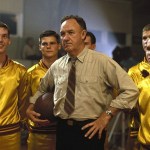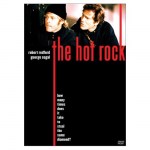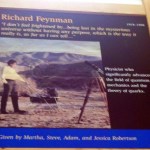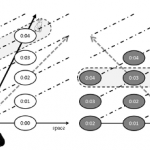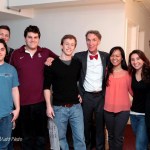In the Media
I've been revising a chapter on collaboration in science for the book-in-progress, making an analogy to team sports. And it occurred to me as I was trying to find a way to procrastinate, that while science is a highly collaborative endeavor, most of the popular stories that get told about science are not. There's no Hoosiers of science out there.
Now, admittedly, the sample of great pop-culture stories about science period is pretty small. But what does exist mostly concerns individual struggles-- the lone genius who can revolutionize science by just thinking about it in isolation, but who…
Adam Frank has an op-ed at the New York Times that tells a very familiar story: science is on the decline, and we're living in an "Age of Denial".
IN 1982, polls showed that 44 percent of Americans believed God had created human beings in their present form. Thirty years later, the fraction of the population who are creationists is 46 percent.
In 1989, when “climate change” had just entered the public lexicon, 63 percent of Americans understood it was a problem. Almost 25 years later, that proportion is actually a bit lower, at 58 percent.
The timeline of these polls defines my career in…
After a couple of very productive days where I closed my Twitter tab because it was too freakin' annoying to read, I checked in briefly Wednesday morning, and found Rhett Allain and Frank Noschese discussing this Veritasium bullet-in-block experiment:
Tom at Swans On Tea offers some analysis, and Rhett offers a video response doing out some of the math:
I basically agree with their explanations, and that should have been that, except that in his discussion Rhett mentioned that the bullet probably doesn't go as far into the spinning block, which prompted Frank to ask whether you could…
Thursday's tempest-in-a-teapot was kicked off by an interview with Dan Vergano in which he suggests science reporting is a "ghetto:"
The idea, and it comes from the redoubtable Tom Hayden, is that science reporting has largely become a secret garden walled off, and walling itself off, from the rest of the world. Instead of reporting on the scientific aspects of news stories — whether Iran really will have the bomb, whether Quantitative Easing will spark inflation, whether Peak Oil is a real concern — we write pretty entertainments about mummies, exploding stars and the sex life of ducks. All…
Over at Galileo's Pendulum, Matthew Francis expresses an opinion that's sure to get him in trouble with the Inquisition and placed under house arrest: Carl Sagan's Cosmos isn't all that:
However, even taking into account the differences in TV between 1980 and 2013, the show is very slow-paced at times. I’m not talking about the mellow oh-so-1970s Vangelis score, or Sagan’s measured style of speech: I mean the obvious stretching of material to make hour-long episodes. I have a long attention span, so I’m not saying Cosmos should be like the frenetic Star Trek reboot; I’m just saying that a…
A little while back, I posted about the pro-theorist bias in popular physics, and Ashutosh Jogalekar offers a long and detailed response, which of course was posted on a day when I spent six hours driving to Quebec City for a conference. Sigh.
Happily, ZapperZ and Tom at Swans On Tea offer more or less the response I would've if I'd had time and Internet connectivity. Tom in particular gives a very thorough exploration of some of the reasons why experiment gets downplayed in popular physics. I particularly liked this bit:
I’m going to put forth a possibility: maybe we have a harder job, in…
I mentioned on Twitter that I was thinking of proposing a Science Online program item about the professionalization of blogging, throwing in a link to post from a couple months ago. That included a link to this SlideShare:
Talking to My Dog About Science: Why Public Communication of Science Matters and How Social Media Can Help from Chad Orzel
And that was re-tweeted by Chris Chabris, kicking off a gigantic conversation about the whole idea of scientists communicating directly with the public (most of which took place after I went to bed last night, so I only saw it in my Twitter…
While we're revisiting blog topics of the recent past, another item from this weekend's visit to the Ithaca Sciencenter, in the form of the picture above. For those with images off, or who read via RSS and won't see the picture, it's a photo of one of the inspirational plaques they have lining the walls of their community room, honoring famous scientists. This particular one is for Richard Feynman, and what struck me about it was that the photo isn't his Nobel Prize portrait, or him playing the bongos, but a somewhat grainy picture of him standing next to a telescope in the desert, pushing a…
Last week's post about communications between scientists and journalists sparked a bit of discussion, and prompted the folks at the IoP's Physics Focus blog to ask me for a guest post advising journalists on how to talk to scientists. The post is now live, with the self-explanatory headline How Journalists Can Help the Scientists They Interview:
The temptation for each party in this situation is to try to push as much of the work to the other as possible, and that’s where most advice from journalists to scientists (or vice versa) fails. Each side treats the conventions of their particular…
Over at National Geographic's other blog network, Ed Yong offers a guide for scientists talking to journalists. Like everything Ed writes about scientists and journalists, this was immediately re-tweeted by 5000 people calling it a must-read. Also like nearly everything Ed writes about scientists and journalists, some of it kind of rubbed me the wrong way.
Given our respective areas of interest, there's approximately zero chance that Ed will ever contact me to ask my opinion of a paper, but I want to push back on a few of these, anyway. Because, in the end, scientists aren't responding in…
Last year, Alan Alda posed a challenge to science communicators, to explain a flame in terms that an 11-year old could understand. this drew a lot of responses, and some very good winners. This year's contest, though still called the "Flame Challenge," asked for an answer to the question "What Is Time?"
This is a little closer to my corner of science, so I considered entering, but as previously noted, I'm crushingly busy at present. And either scripting/ shooting/ editing a video, or doing the necessary work to hack a written response down to the prescribed 300 characters was more time than I…
I was re-reading bits of James Gleick's Feynman biography, and ran across a bit near the end (page 397 of my hardcover from 1992) talking about his relationship with his children, talking about how ordinary he seemed at home.I particularly liked the sentence "Belatedly it dawned on them that not all their friends could look up their fathers in the encyclopedia." It occurred to me that that would be a good line for an obituary.
This is not due to any particularly morbid cast of mind on my part, but lingering blowback from the kerfuffle over the New York Times obituary for Yvonne Brill a couple…
Last week, I gave my evangelical talk about science blogging to the Physics department at Wright State, and also a lot of education students who came to the talk (which made a nice change in the sort of questions I got). It's basically this talk that I gave at Cornell a couple of years ago, with a few updates to the slides that don't require a new upload to SlideShare:
Talking to My Dog About Science: Why Public Communication of Science Matters and How Social Media Can Help from Chad Orzel
The pitch that I make, if you don't want to flip through the slides, is that communicating to a…
I had lunch with Ethan Zuckerman yesterday, and we were talking about technology and communicating science to a mass audience, and Michio Kaku came up. Specifically, the fact that he's prone to saying stuff that's just flat wrong, if not batshit crazy-- see this angry post from 2010 for an example.
It was amusing, then, to return to my RSS reader and find first Sean Carroll and then Matt Strassler expressing outrage and annoyance over some incredibly dumb things Kaku said about the Higgs Boson. My initial reaction was along the lines of "Yeah, welcome to the club," but I suspect that that's…
On Twitter and blogs, we're having another round of complaints about sensationalism and hype in science stories-- Matthew Francis and Gabrielle Rabinowitz are the latest to cross my social media feeds. I've also seen some stories recently (that I'm too lazy to dig up) complaining about the latest Higgs Boson stuff, and I'm sure if you wait ten minutes there'll be a biologist upset about something in Science this week.
The basic form of this is nothing particularly new: the argument is that by representing incremental improvements in science as Revolutionary! Developments! the media are…
In the twelve years I've been at Union, there are only two times I've tried to go to an evening speaker and been turned away. Once was 4-5 years ago, when Maya Angelou spoke on campus, the second time was last night, when Bill Nye the Science Guy spoke. I managed to make it to the foot of the steps of Memorial Chapel before they hit the fire code (939, I think they said the number was) and turned everybody away. There were probably 20-30 students behind me in the line, so even if I had made it all the way to the front, I might've stepped aside and let one of them in instead.
It's worth…
One of the things that's been rattling around in my head since ScienceOnline back in January is the need for a greater diversity of voices in science communication generally. I don't mean diversity in the sense of racial and gender make-up of the people doing the communication, though that would be nice, I mean a greater diversity in the way people talk about science.
This started bugging me in the panel that led to the "Journosplain" image that I'm somewhat unfairly tagging as the "featured image" for this post (grabbed from here)-- somewhat, because it's not really Carl Zimmer's fault. But…
In which I discuss the manner in which and the degree to which Twitter is ruining the media.
------------
Yesterday, Kevin Drum posted saying that Twitter is ruining political journalism, calling out its role in solidifying media groupthink before events are even completed. That seemed like a pretty good criticism to me, but like a true squishy liberal, Kevin later retracted his comments in the face of criticism. I saw the second link come across Kevin's Twitter feed, and responded there, saying:
You were right the first time. But Twitter's only the latest step in the continuing degradation…
In which I get a little rant-y about yet another proud display of ignorance from the Washington Post's education blog.
------------
Some time back, I teed off on a school board member who couldn't pass a simple math test, who proudly told the world about his ignorance via a post at the Washington Post's education blog. Bragging about ignorance is apparently a Thing for that blog, which recently offered another fine example, with a parent complaining about his son being forced to take chemistry. The author, "nonprofit executive" David Bernstein, is a former philosophy major, who evidently didn…
It's a banner day for science explainer things I wrote, as a piece I wrote has just gone live at Tor.com:
Why Gandalf Is Wrong
Even as a kid, reading J. R. R. Tolkien’s The Lord of the Rings at the golden age of twelve or so, Gandalf’s response to Saruman never sat well with me. Splitting white light into its component colors is awesome, and taking things apart is the best way to learn how they work. Knowing how things work is the first step toward making them work better, a process that leads to the technologies that make modern life comfortable enough to, among other things, provide Oxford…
